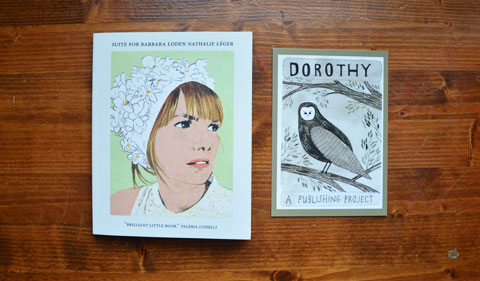On the Dial | Suite for Barbara Loden

I've probably read more about Barbara Loden and the feature film she wrote and directed, Wanda, than any other actress and movie that I've never actually seen.
In Frequencies: Volume Two, we published a "walking" essay by Kate Zambreno that orbits the enduring impact of Loden, her relationship with filmmaker Elia Kazan, and the similarities between Loden's real life and the title character she plays in the film.
Next month, our friends at Dorothy are publishing a striking new book by Nathalie Léger that won the 2012 Prix du Livre Inter. Eimear McBride calls it "inventive and affecting," and it absolutely is. It's a book that creeps up on you in a very sudden, surprising way.
The book project began when Léger was writing about Wanda for a movie encyclopedia entry. She is compelled to do research—admittedly too much for the type of succinct entry the database is seeking—and decides to expand the subject into Suite for Barbara Loden, an impassioned reflection of not just Loden's own haunting mythology and how it merges with her portrayal of Wanda, but also the author's life, and that of her mother.
"What is it that attracts me so to Wanda? I have never been homeless, I have never abandoned my children, I have never given over my existence or even my financial affairs to any man, I don't think I have ever entrusted even the most banal area of my life to anyone. I've left men, sometimes heartlessly, with the trembling joy that one feels slipped away down a side street, or vanishing into a crowd, or jumping onto a passing train, or standing someone up; the acute and rare pleasure of avoiding something, of evading something, of disappearing into the landscape—but never the experience of surrender. And yet: it did happen to me once, just one time and it was enough..."
Léger concludes the above passage with the line, "Only this matters: not to be alone, not to be abandoned."
I had finally hoped to see Wanda this August when The Wexner Center for the Arts—a world-class art gallery, wonderfully-stocked bookstore, and theater which features the best programming I've ever come across—screened the movie as a double feature with the more contemporary Winter's Bone as part of their 'Fierce Women of Film' series. Unfortunately, it wasn't meant to be as I was out of town at the time.
Perhaps this idea ties back in to the heady issue of remembering and mis-remembering that Nicholas Rombes deals with in his film The Removals and even more directly in his novel, The Absolution of Roberto Acestes Laing. If, one day, I finally do get to see Wanda, it will undoubtedly be through the perceptive prism of Léger and Zambreno, and their own reflections, memories, and impressions. Which isn't to say that I can't see the movie now, but that I like the concept of experiencing a movie not through actually plopping down in a chair and watching it, but rather through thoughtful, affecting meditative written texts.


Comments